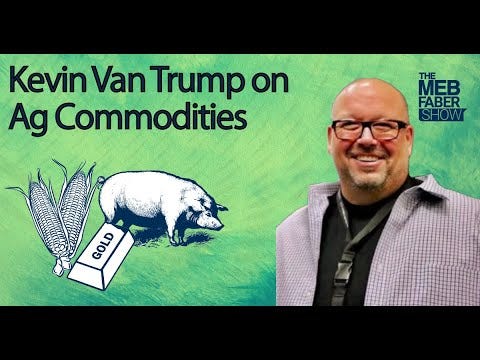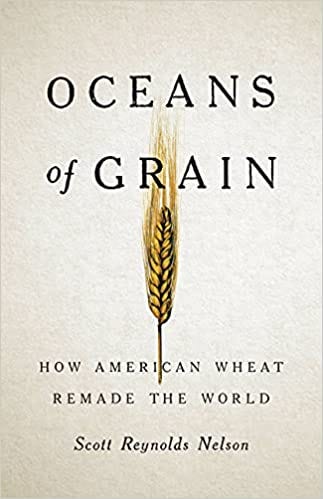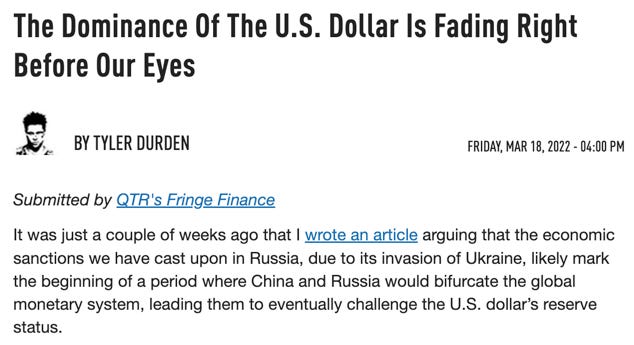Welcome to issue #3 of my mid-week podcast write-ups, this time with The Meb Faber Show and Kevin van Trump.
In case you've missed it, here's a link to my usual weekend piece with a recap of the relevant macro events and a comprehensive look at markets from every angle:
If you like this newsletter, please consider subscribing and sharing it or forwarding it to others who might be interested. I'm also on Twitter @fxmacroguy if you want to reach out.
One more thing. You seem to like newsletters, so here's a great way to discover new stuff to read for free: The Sample. They will regularly send you an issue of a different semi-random newsletter you might be interested in. If you sign up using my referral link, I get bonus points and my newsletter will be forwarded to others to check out.
Release date: 15.08.2022
Host(s): Meb Faber
Guest(s): Kevin van Trump (@KevinVanTrump, https://www.vantrumpreport.com/)
Charts were all added by me.
Notes
Q: Tell us a bit about your story!
Kevin started working for the NFL after college and got into trading through friends in Chicago. He was hired immediately because of his size (about 1.93 m, 158 kg), which would make it easy to buy and sell on the floor. He started trading FX futures on the Merc, then livestock, later treasuries and corn, beans, and wheat for different firms.
Q: How long have you been writing the Van Trump Report?
For about 12-13 years. Kevin started journaling and writing down his own thoughts on trading and investing at a time when a lot of things were going on in his life (two young kids, fallout from the housing market, some business of his going broke), and it was unintentionally very successful, so he started charging for it.
Q: What's your framework when you think about commodities, what's your investment process?
Kevin mostly trades corn, beans and wheat. Also energies (ethanol, plants, CNG fuelling facilities) and feedlot. He starts every day with a macro perspective. Markets have changed: they have more fund interest and there's more cross hedging from bigger players.
He remembers one year when corn and wheat were just running up and nobody could figure out why. There were headlines about a polar vortex hitting in the winter. Equity traders wanted to hedge an expected drop in Q1 earnings because they thought the polar vortex would have everybody staying at home. They figured that wheat would be very sensitve to a polar vortex because it would kill off the crop, and they tried to cross-hedge their equity portfolios.
So, Kevin thinks there's a lot more cross-hedging now, more interesting spreads, traditional spreads aren't traditional any more, there's more high-frequency trading, more algos. This makes it challenging to look at historic data in certain ways.
Q: How would you characterize your approach… technical, fundamental or discretionary?
Kevin started trading fundamentally but gravitated towards technical trading. He didn't have much success with that, so his approach now is fundamentally driven with technical analysis for entries and exits.
Meb mentions a book called “Oceans of Grain" (link).
Q: Wheat hasn't done much over the past decade, but post-Covid it started to inch up and went bananas last year. Give us a little perspective!
Kevin mentions that the Russian invasion of Ukraine added fuel to the fire. There were big fund movements, but in the last few months that has been dialled back. The appetite for commodities has come down because of fears of a global recession. That hit grains and especially wheat.
The US has become what is called the ancillary supplier of wheat. People go to Russia, the Black Sea and parts of Europe for cheap grain. If they can't get it there and need it delivered anyway, they come to the US as an ancillary supplier.
The strong dollar is another headwind. There are a lot of unknowns about whether exports will improve. The humanitarian grain corridor out of Ukraine made a lot of headlines, but Kevin doesn't believe it will make much of an impact.
Funds use wheat as a cross-hedge, so they're short wheat betting on a global recession.
Q: Are you trading through futures, options, underlying equities?
Kevin uses futures 80-90% of the time, but there are opportunities for options players.
Q: What does the rest of the ag space look like?
There's a bit more demand for beans because there's no replacement for the high protein beans. Soybean meal has been the leader of the bull run because that's used to feed livestock. Soybean oil has been more of a byproduct.
When prices get high, corn will be used as a substitute for soybeans, but there's really no substitute for soybean meal, and the world needs more of it as a feed for livestock. Now there's also a big push for oil from demand for cooking and biofuels. Money is being invested in more processing facilities.
He also expects more acres of soybeans to be planted over the next five years, but supply is always tricky to get right in these markets. The demand story in beans is good.
Corn is a bit more of a weather market. Wheat is the easiest crop to grow, next is rice and beans, and corn is a bit more difficult and sensitive. The timing of the weather is pretty important. Chinese demand remains a big question mark, and the war in Ukraine is also a big unknown. These two are the driving factors.
Q: China has had a big impact on commodities over the past decade. What's going on with China?
During the early days of the Trump administration, there was some intel on how China started to pivot away from a western diet. There had been a big push for a long time to become more westernized, but now the Chinese government wanted to shift away from a Western-type society and diet. That's a bit concerning: have we peaked at the demand side for cattle, beef, livestock and things of that nature? Kevin is sceptical, because they may already be walking that back a bit. He thinks Chinese demand is worrisome, and that they are trying to do more of their deals with South America. Also, they are trying to push the dollar off its position as a leading currency.
Meb mentions he's been doing a lot of polls on Twitter, and one of them was asking people whether they invest in real assets (commodities, real estate, TIPS). Most people that responded had very little in commodities. Canadians and Australians are an exception because they tend to be more natural resource focussed.
Q: What role does the big-picture monetary policy play?
It's very important to Kevin, he's starting off every day trying to get a better understanding of the macro perspective: what's going on with the dollar, with rates, long-term debt, and where money is going to flow.
Q: What has been the sentiment in the responses and feedback you've been getting this year vs. the past year?
Kevin thinks the “doom and gloom” vibe sells: people want to hear conspiracy theories, the dollar is doomed, buy shotguns and gold. So, a lot of his readers ask him why he's so optimistic. The vibe is people notoriously want to be bearish, but he doesn't believe that the US is just going to fall over in one shot and be dead.
Q: What changes have you seen in the ag markets, especially regarding the role technology has been playing?
Kevin responds that he and his family are kind of angel investors in ag startups. He mentions iSelect who do a lot of investing in ag startups as well. Change in the ag business tends to be more incremental than happening in big leaps. He starts his investing thesis with demographics: spending habits for millennials are very different from spending habits of boomers. Millennials will pay $8 for a coffee at Starbucks or $10 for a burrito. That's a big shift in agriculture.
Farmers used to grow whatever they wanted to grow and the consumer picked from that. That's changing dramatically with the consumer dictating that to a much larger degree: what is grown, how it is grown, and what chemicals they want and don't want on it. Blockchain will be used in agriculture to allow customers to see where crops come from. He mentions a few examples:
An E. coli outbreak at Chipotle as an example where they wanted to know exactly which farm and which field their produce came from.
A lot of rice is getting blockchained for Chipotle.
Cotton is being tagged and put on the blockchain so customers can get a story of where their t-shirts come from.
Benson Hill has contracts with Impossible Foods to create specific seeds with the right characteristics for their food. Benson uses CRISPR to create the right bean.
Q: How should the typical investor approach the ecosystem of farming, ag-tech, and commodities?
Kevin says he opened Van Trump Farm & Land because there's so much interest around these things. They also partnered with AcreTrader. There are three groups:
“Legacy land” where people buy land and keep it in the family
Working farms growing crops or leasing land to solar or wind energy
Ag business, e.g. turning a farm into a whiskey farm that also has merchandise or does tours
Other ways would be through ETFs, futures or options.
Kevin advises a lot of funds on buying farmland with the expectation it's going to be worth more in 30 years.
Meb warns investors of the risks that come with having no experience in the farming business.
Q: How does it work for institutions on an international level?
Kevin says he owns farms in Argentina and Brazil with partners. There was a massive learning curve where things looked great in theory but were a lot less great in practice. It's a lot more art than science. He bought land in Brazil with a group of farmers near Teresina. There's about 70 inches (178.000 mm) of rainfall per year, so they planted eucalyptus and other crops like rice, wheat and beans. In theory, it was great, but they had to build roads with local engineers, and they didn't build ditches so the water just pooled in the road. Other things like building fences also took a lot longer than it does here.
He says he's never been on the winning side with farms in foreign countries and most of his friends haven't been either.
There's a lot of fragmentation in the ag world right now, that's going to bring in institutional money and will lead to more consolidation.
Q: What are easily avoided mistakes for new entrants?
It depends on how fast you're looking for returns. If you're managing money for your family long-term, it's different than going for consistent annualized returns on a quicker timescale. That's a lot more difficult in the ag space because there are so many unknowns each year, e.g. fires or droughts.
There's a substantial learning curve, so getting in the business and hoping to make money the next year or two is probably a fallacy.
Q: What's been your most memorable investment, good or bad?
Kevin thinks it's best not to think about the last trade similar to a poker player or a golfer not thinking about their last hand or last hole.
He says he was early in TSLA and fairly early in Bitcoin.
Meb mentions a quote: “Every trade makes you richer or wiser, but never both.”
Q: What's FARMCON?
It's an annual event, started about 15 years ago with friends and turned bigger over the years with over 1.200 people, discussions and guest speakers. It's going to be on January 4th and 5th.











